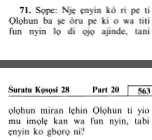28vs71
Select any filter and click on Go! to see results
قُلْ أَرَأَيْتُمْ إِن جَعَلَ اللَّهُ عَلَيْكُمُ اللَّيْلَ سَرْمَداً إِلَى يَوْمِ الْقِيَامَةِ مَنْ إِلَهٌ غَيْرُ اللَّهِ يَأْتِيكُم بِضِيَاء أَفَلَا تَسْمَعُونَ
Qul araaytum in jaAAala Allahu AAalaykumu allayla sarmadan ila yawmi alqiyamati man ilahun ghayru Allahi yateekum bidiyain afala tasmaAAoona
Index Terms
Click to play
Yoruba Translation

Hausa Translation
Ka ce: "Shin, kun gani, idan Allah Ya sanya dare tutur a kanku har zuwa Rãnar Ƙiyãma, wane abin bautãwa wanin Allah zai zo muku da haske? Shin, bã ku ji?"
Asbabu n-Nuzuul (Occasions of Revelation)
Night and Day are among the Blessings of Allah and are Signs of Tawhid
Allah reminds His servants:
قُلْ أَرَأَيْتُمْ إِن جَعَلَ اللَّهُ عَلَيْكُمُ اللَّيْلَ سَرْمَدًا إِلَى يَوْمِ الْقِيَامَةِ ...
Say: "Tell me! If Allah made the night continuous for you till the Day of Resurrection, which god besides Allah could bring you light! Will you not then hear!''
Allah reminds His servants of His favors towards them by subjugating for them the night and day, without which they could not survive. He explains that if He made the night continuous, lasting until the Day of Resurrection, that would be harmful for them and would cause boredom and stress.
So He says:
... مَنْ إِلَهٌ غَيْرُ اللَّهِ يَأْتِيكُم بِضِيَاء ...
which god besides Allah could bring you light!
meaning, `with which you could see things and which would bring you relief.'
... أَفَلَا تَسْمَعُونَ ﴿٧١﴾
Will you not then hear!
يقول تعالى ممتنا على عباده بما سخر لهم من الليل والنهار اللذين لا قوام لهم دونهما وبين أنه لو جعل الليل دائما عليهم سرمدا إلى يوم القيامة لأضر ذلك بهم ولسئمته النفوس وانحصرت منه ولهذا قال تعالى : " من إله غير الله يأتيكم بضياء " أي تبصرون به وتستأنسون بسببه " أفلا تسمعون " .
"قل" لأهل مكة "أرأيتم" أي أخبروني "إن جعل الله عليكم الليل سرمدا" دائما "إلى يوم القيامة من إله غير الله" أي بزعمكم "يأتيكم بضياء" نهار تطلبون فيه المعيشة "أفلا تسمعون" ذلك سماع تفهم فترجعون عن الإشراك
أي دائما ; ومنه قول طرفة لعمرك ما أمري علي بغمة نهاري ولا ليلي علي بسرمد بين سبحانه أنه مهد أسباب المعيشة ليقوموا بشكر نعمه
I'raab - grammatical analysis of the Qur'an
«قُلْ» أمر فاعله مستتر والجملة مستأنفة لا محل لها ، «أَرَأَيْتُمْ» الهمزة حرف استفهام وماض وفاعله ، والجملة مقول القول ، «إِنْ» حرف شرط جازم «جَعَلَ» ماض مبني على الفتح في محل جزم فعل الشرط «اللَّهُ» لفظ الجلالة فاعل والجملة ابتدائية لا محل لها. «عَلَيْكُمُ» متعلقان بالفعل «اللَّيْلَ» مفعول به «سَرْمَداً» مفعول به ثان «إِلى يَوْمِ» متعلقان بجعل «الْقِيامَةِ» مضاف إليه «مَنْ إِلهٌ» مبتدأ وخبره «غَيْرُ» صفة إله «اللَّهُ» لفظ الجلالة مضاف إليه «يَأْتِيكُمْ» مضارع ومفعوله والفاعل مستتر «بِضِياءٍ» متعلقان بالفعل والجملة الفعلية صفة إله. «أَفَلا» الهمزة حرف استفهام إنكاري والفاء حرف استئناف ولا نافية «تَسْمَعُونَ» مضارع وفاعله ، والجملة مستأنفة لا محل لها
